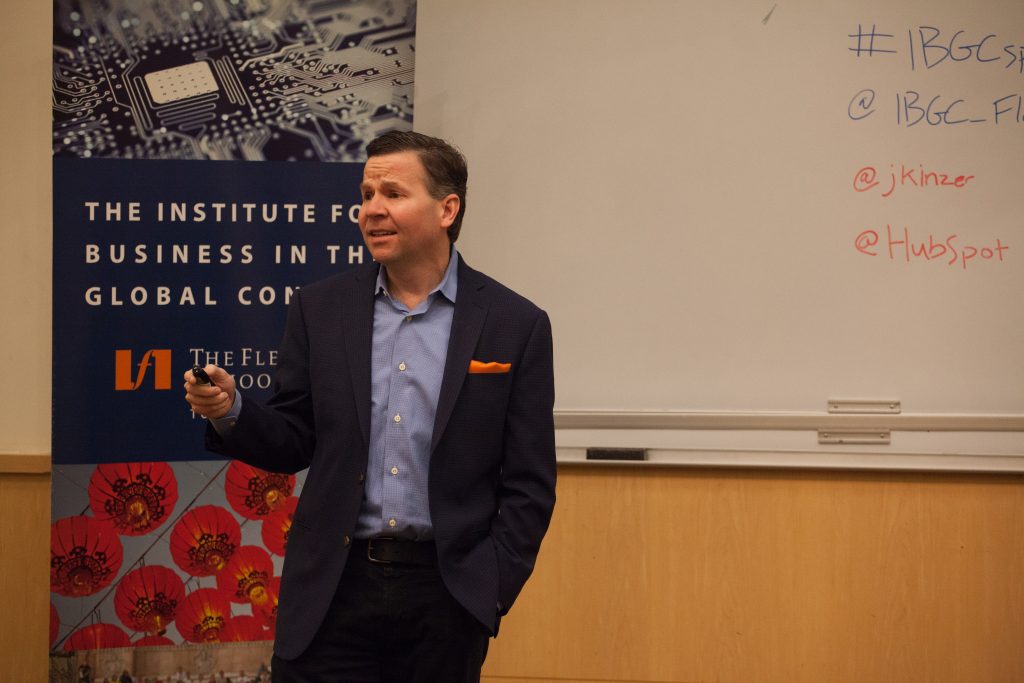HubSpot CFO John Kinzer Discusses Company, Career at IBGC Speaker Series

How do the decisions you make over the course of your career influence your ultimate trajectory? HubSpot’s Chief Financial Officer, John Kinzer, posed this question while discussing his impressive career and current role in a presentation for The Institute for Business in the Global Context (IBGC) speaker series on March 27. Kinzer manages HubSpot’s finances and played a key role in the company’s initial public offering.
Kinzer described some of the major career decisions that paved his path to HubSpot. For instance, he said studying at Virginia Tech’s business school helped prepare him for his first major career step: entering the field of public accounting.
After working for Arthur Anderson for several years, Kinzer took an accounting job with MCI rather than attend business school. At MCI, he gained analytical skills and learned the important connection between marketing and business.
While working at MCI, Kinzer got a call from E-centives, an online coupon company, and took a job there. “I’d been at two very big companies and wanted to do something smaller,” he explained.
E-centives didn’t perform well, so Kinzer started to consider other options. “No matter how good the people are, unless the business model scales, it’ll never work out,” he explained. It turns out the E-centives CFO knew the CFO at Blackboard, an education software company; Kinzer made the connection and decided to join that company next.
“It was a really good run [at Blackboard]. The company was doing great, the culture was cool, it was a mission-based company — we were trying to improve education,” he said. Still, Kinzer had his eyes on a CFO position, but it wasn’t easy to break his way in: “Getting your first CFO job is really hard because everyone wants someone with experience [in the role].”
When Kinzer missed out on a promotion to CFO at Blackboard, he stayed right where he was, despite the disappointment. “I decided to swallow my pride and stick it out and see what happened,” he said. Things worked out in the end, and he ended up getting that CFO gig at Blackboard a few years later.
Accustomed to being close to family in D.C., Kinzer was hesitant when a job outside the area presented itself. But HubSpot, an inbound marketing and sales SaaS company, impressed him so much, he made an exception. “I just really fell in love with the company, the business model and the people, and I decided to move the family,” he said.
The founders of HubSpot had created a business model that strongly appealed to Kinzer: “They wanted to create a more human-based marketing approach.” He was drawn to the positive company culture, too.
But it’s not all fun and games. Kinzer noted that there is an incredible amount of hard work to be done at a company that’s growing as fast as HubSpot. Publicly traded since 2013, the company’s revenue retention is almost 100 percent. It’s a vastly global company, too. HubSpot is utilized in more than 90 countries with offices in six locations.
Naturally, many variables are key to HubSpot’s success, but Kinzer said the fact that 30 percent of their business is international certainly helps. Doing 40 percent of business through a channel — partners, web redesign firms and digital marketing agencies that resell HubSpot and do inbound marketing for them — also makes a difference.
Over the past few years, HubSpot has added various upgrade options for customers. The company has also introduced products people can buy and different sales products. “This is another lever that will lead to growing amounts of money that customers will spend with us,” Kinzer said.
Kinzer’s exposure to numerous companies throughout his career has taught him valuable lessons, such as when to take risks and to always play to his strengths. All in all, Kinzer has learned to work for the company where you have the best opportunity and where you will learn and grow the most. “Really discriminate about where you go and put that way above what the opportunity actually is,” he said.
